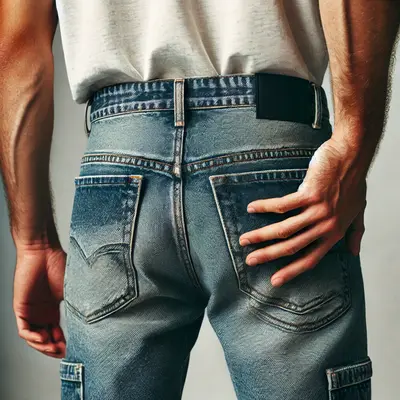Excessive sweating in the male genital area, also known as groin hyperhidrosis, is a common but often unspoken issue that affects many men. Whether it’s the discomfort of moist underwear or the embarrassment during intimate moments, this issue can have both physical and psychological impacts. While this topic may be a bit awkward to discuss, it’s crucial for those affected to know that they are not alone and that solutions do exist.
Causes of Excessive Sweating in the Groin
Sweating is a natural process that helps regulate body temperature, but when it becomes excessive in the groin area, it can indicate an underlying condition. Several factors can lead to this problem, and it’s essential to understand them in order to find the most effective treatment.
1. Hyperhidrosis
Primary focal hyperhidrosis is a condition that causes excessive sweating in specific areas, including the groin. This type of hyperhidrosis isn’t necessarily linked to heat or physical activity. It can result from overactive sweat glands with no obvious underlying health issues.
2. Hormonal Changes
Hormonal imbalances can also play a role in excessive sweating. For instance, teenagers and men undergoing significant hormonal changes often experience increased sweating. Hormones like testosterone can influence the activity of sweat glands, particularly in sensitive areas such as the groin.
According to Dr. Mark Sayers, a leading endocrinologist, “Hormonal changes, especially during puberty, can often lead to increased sweat gland activity in areas like the groin and armpits.”
3. Obesity
Excess weight is another significant factor. Obesity can cause increased sweating due to more insulation around the body, leading to excessive heat and increased sweating, particularly in areas where skin rubs against skin, such as the groin.
4. Lifestyle Factors
Certain lifestyle habits can also exacerbate sweating in this region. Tight clothing, synthetic fabrics, and poor hygiene are contributing factors. Clothes that do not allow proper air circulation can trap heat and sweat, making the condition worse.
Dermatologist Dr. Linda Gomez notes, “Switching to looser, breathable fabrics like cotton can make a notable difference for men dealing with groin hyperhidrosis.”
Symptoms and Implications
Aside from discomfort, excessive sweating in the male genital area can lead to skin irritation, fungal infections, and even psychological distress. Many men feel embarrassed discussing the issue, which only prolongs their discomfort. Understanding the symptoms and the root causes can help individuals seek appropriate help.
| Symptom | Description |
|---|---|
| Persistent Moisture | Continuous dampness around the groin |
| Odor | Unpleasant smell due to bacteria |
| Chafing & Rash | Skin irritation from excess moisture |
Practical Solutions to Reduce Groin Sweating
1. Proper Clothing Choices
Switching to breathable fabrics is one of the simplest steps you can take to manage excessive sweating. Materials like cotton and moisture-wicking fabrics allow for better airflow and reduce moisture accumulation in sensitive areas.
2. Personal Hygiene
Keeping the area clean and dry is crucial. Regular showers, particularly after physical activity, help minimize bacterial buildup. Use mild soaps and thoroughly dry the area before putting on fresh clothes.
“Daily hygiene routines, including drying the groin area thoroughly, can greatly reduce the effects of excessive sweating,” says Dr. Arnold Bennett, a dermatologist specializing in men’s health.
3. Antiperspirants and Powders
While antiperspirants are commonly used for underarm sweating, they can also be applied to the groin area. Look for a product specifically designed for sensitive skin. Powders, such as cornstarch-based ones, can also help absorb excess moisture throughout the day.
4. Diet Adjustments
Certain foods can trigger sweating more than others. Spicy foods, caffeine, and alcohol can increase the likelihood of excessive sweating. Cutting back on these types of foods may help reduce overall perspiration levels.
When to Consult a Doctor
If sweating becomes excessive to the point where it affects your daily life, it may be time to consult a healthcare professional. In some cases, prescription medications or specialized treatments may be needed. For instance, some men find relief through botulinum toxin (Botox) injections, which temporarily reduce sweat gland activity.
| Treatment Option | Description |
|---|---|
| Prescription Antiperspirants | Stronger antiperspirants recommended by a doctor |
| Botox Injections | Temporarily blocks sweat gland activity |
| Surgery (ETS) | In rare cases, surgery may be suggested |
Psychological Impact and Addressing It
For some men, the impact of excessive sweating goes beyond physical discomfort. It can lead to feelings of embarrassment and social withdrawal. Understanding that this is a medical condition—and not a reflection of poor hygiene—can be a crucial first step towards seeking help and breaking the stigma.
Excessive sweating in the male genital area can be challenging, but there are multiple ways to manage it. Lifestyle adjustments, proper hygiene, and seeking medical advice when necessary can all contribute to finding relief. Remember, it’s important to address this issue openly and seek help without shame—effective solutions are available, and no one should have to live in discomfort.









